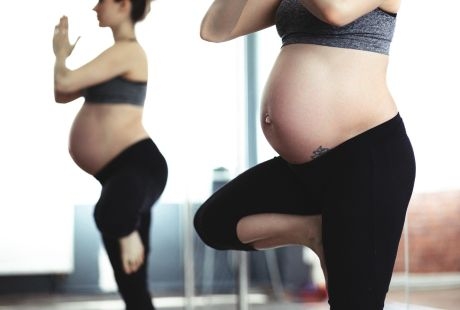

1 January 2019
4 min read
Specialist fitness clothing for pregnant women can reduce bounce of the ‘bump’ by half, even when running, according to new research.
The study was carried out by leading experts in the biomechanics of breast bounce at the University of Portsmouth.It is the first time the support properties of specialised pregnancy sportswear have been tested against generic high street fitness clothing.
In a series of experiments, the bumps of pregnant women wearing non-specialist fitness clothing experienced bounce movements of up to 6.2cm. This was reduced to just 3.8cm when the same women wore technically designed supportive maternity fitness wear.
The Research Group in Breast Health, led by Professor Joanna Wakefield-Scurr, has a long track record of publishing research on breast bounce. The research team is routinely asked by lingerie manufacturers, the military and the health sector to advise on bra design to reduce breast bounce and related breast pain. This is the first time the team has been asked to test clothing’s ability to reduce the bounce and movement of a pregnancy bump during exercise.
Professor Wakefield-Scurr said: “Even though it was a small scale study, the findings are compelling and statistically significant.”
Even though it was a small scale study, the findings are compelling and statistically significant.
Professor Joanna Wakefield Scurr, Professor of Biomechanics
Her colleague, Sophie Rej, who carried out the tests, said: “Fitness wear is an evolving market and new maternity fitness wear brands are emerging to meet the changing needs of a woman’s body during pregnancy.
“Our tests on FittaMamma specialist maternity fitness wear reduced bounce of the bump in all directions by 48 per cent. This suggests this clothing might help women overcome common barriers to exercise, such as pregnancy-related pain.”
The clothing did not have an effect on women’s balance, joint movement or muscle activity.
Previous research has shown that while nearly half pregnant women take some form of exercise, very few do enough to meet health guidelines. Medical guidelines, including the NHS, recommend that all healthy pregnant women should aim for 30 minutes exercise on at least five days a week to benefit themselves and their baby. However, the intensity, duration and frequency of exercise all tend to tail off or stop altogether for most women once they’re in their second trimester – weeks 13-28 of pregnancy.
Fitness wear is an evolving market and new maternity fitness wear brands are emerging to meet the changing needs of a woman’s body during pregnancy. Our tests on FittaMamma specialist maternity fitness wear reduced bounce of the bump in all directions by 48 per cent. This suggests this clothing might help women overcome common barriers to exercise, such as pregnancy-related pain.
Sophie Rej, PhD Researcher
Co-founders of Sussex-based company, FittaMamma, Deborah Hazeldean and Alexandra McCabe said the results were ‘wonderful’.
Additional independent research conducted by the University alongside the biomechanical testing process revealed that clothing was the third biggest barrier to pregnant women exercising.
Tiredness was the main barrier, while issues around the bump ‘getting in the way’ was the second.
Alexandra said: “It fully vindicates what we believed, and we are hoping this will empower more women to keep exercising through their pregnancies.
“The benefits of staying active are compelling and it’s a dreadful shame so many women stop exercising once they become pregnant. Our aim is to remove the barriers to pregnancy fitness so women can continue to exercise with confidence and support.
“This research shows our clothing provides measurable support for pregnant women, making a significant improvement to comfort and security, enabling them to carry on exercising right throughout their pregnancies.”
The benefits of staying active are compelling and it’s a dreadful shame so many women stop exercising once they become pregnant. Our aim is to remove the barriers to pregnancy fitness so women can continue to exercise with confidence and support. This research shows our clothing provides measurable support for pregnant women, making a significant improvement to comfort and security, enabling them to carry on exercising right throughout their pregnancies.
Alexandra McCabe, Co-founder of FittaMamma
Pregnancy can cause lower back ache and pelvic girdle pain, potentially putting some women off exercising, she said. Supporting the bump and reducing the amount of bounce, even during walking is likely to help alleviate this.
The participants rated the level of support for the back provided by the FittaMamma fitness wear at 8.25 out of 10, compared to 3.5 out of 10 for ‘standard’ fitness wear and support for the hips and pelvis at 8.75 out of 10 compared to 3.25 in the comparison vest and leggings.
The women taking part in the study were four-five months’ pregnant and their average age was 32. In a series of experiments, they were asked to stand, walk briskly and run.
All the women had taken part in some form of exercise before becoming pregnant and most were keen to continue. Following the experiments, all said they felt more confident when their bump was supported and most agreed that they would be more likely to undertake more exercise when wearing the supportive FittaMamma clothing.
The comparison high-street maternity vest and leggings was a viscose and cotton blend, FittaMamma’s fitness wear is a performance sports fabric made from polyester and elastane.
